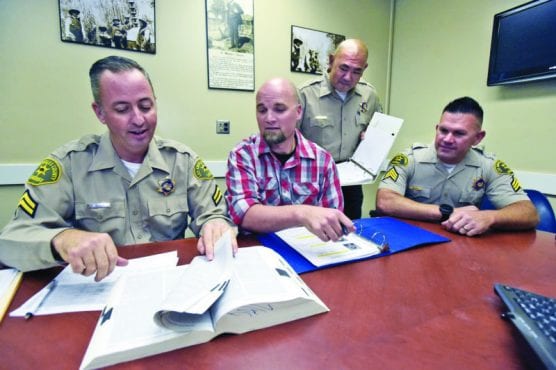Santa Clarita Valley’s top cop keeps on the wall by his desk a laminated poster the size of a dinner placemat that bears the face of every person who has died of a drug overdose in the SCV.
“It’s to remind me of the battle we’re in,” Capt. Robert Lewis of the Santa Clarita Valley Sheriff’s Station said this past week.
The battle is over drugs, to stop their proliferation, steer kids clear of them and to stop them from claiming any more lives in the SCV, particularly young ones. The faces of 70 OD victims fill the chart.
Enter the J-Team, which sounds a lot like the A-Team, and if the popular TV show and movie is about a hand-picked team of individuals with specific skill sets mandated to complete a Herculean task, then the J-Team and the A-Team have a lot in common.
The J-Team — short for Juvenile Intervention Team — was created about 10 years ago when a mother walked into the Sheriff’s Station and asked, according to Lewis: “What are you doing, as a station, to combat drugs since my son passed away from a drug overdose?”
Putting together the J-Team was the answer to her question.
“If the law enforcement here and the city does not put in the effort to change lives, we’ll never change any of them,” Lewis said.
The J-Team’s mandate, he said, is to “deal with narcotics and intervention when it comes to juveniles and adults.”

Intervention Specialist Travis Sabadin displays drug paraphernalia during the Santa Clarita Veteran’s Services Collaborative’s Visit with a Vet event on September 11, 2019. | Photo: Bobby Block/The Signal.
Skill set
As the team heads into its second decade of battling drugs and saving kids, the J-Team, like the A Team, is on a mission. It’s being bolstered, tweaked and, as of last week, assigned a new sergeant.
This past week, members of the specialty team came in from the street to answer questions.
At the helm of the J-Team is Sgt. Mike Pokorny. Seasoned J-Team Detective Bill Velek is the veteran, being the only one who’s been with the team since it was formed in 2010.
Casually dressed and out of uniform is Travis Sabadin — the team member assigned to deal with juvenile intervention.
And, rounding out the team is Detective Gregg Yokoyama, who has seven years with the LASD, and is now assigned to deal with adults and adult intervention.
A fifth member — called an intervention specialist — is scheduled to join the J-Team in two months, Lewis said.
The recruit is to work with Yokoyama, dealing specifically with adults.
Drug trends
As the team assembled on the day of the interview, about to share details on one of the latest drug trends deputies are tracking, hanging just overhead was a framed, wall-mounted, black-and-white photograph taken about 100 years ago of cops on a rugged stretch of the SCV dismantling an illegal still.
Velek, the veteran, glances at the photo and points out that, from the beginning of civilization, there have always been mind-altering drugs.
A century ago, it was moonshine. Now the trend is meth.
“For a while there, heroin was becoming a large concern,” Velek said. “For a short phase, we had a lot of psychedelics come in. Right now, it’s counterfeit drugs.”
Velek calls them “pressed” drugs — opioids “made in somebody’s garage” to resemble trade names such as Oxycontin.
“People want name-brand pills,” he said, reflecting on the fear shared by addicts of using unknown drugs.
“One of the deaths we had, (person who overdosed) thought it was one thing, but ended up being (the highly addictive opioid) Fentanyl,” Velek said.
Juvenile intervention
Juvenile intervention specialist Travis Sarabin took center stage last week at a standing-room-only symposium about vaping held at City Hall when he told parents to hug their kids when asked: “How do I know my kid is vaping?”
“They’ll smell different, so hug them,” he said.
His casual, easy-going style resonated with parents and teens alike.
“I had a parent tell me, ‘I hug my kid all the time now,’” Sarabin said.
The fact that local parents have listened to the J-Team for 10 years now suggests to the team that they’re on the right track.
DFY in SC
One of the mainstay tools in the J-Team’s toolbox that now carries with it a successful track record is the Drug Free Youth in Santa Clarita program. Its mission is to: “Educate and empower students to make good choices, leading towards positive and healthy behaviors.”
“What I end up seeing with parents is that they realize it takes a community to raise them,” Sarabin said.
And on the question of turning adult addicts around, Yokoyama admits adult intervention is a tough challenge, but necessary.
“After you’ve been arrested enough times, there may be a time you turn for help,” he said.
“They have to want to get clean,” Velek said about the adults. “But, we’re there when they’re ready.”
Like this:
Like Loading...
Related





 Tweet This
Tweet This Facebook
Facebook Digg This
Digg This Bookmark
Bookmark Stumble
Stumble RSS
RSS



























REAL NAMES ONLY: All posters must use their real individual or business name. This applies equally to Twitter account holders who use a nickname.
0 Comments
You can be the first one to leave a comment.